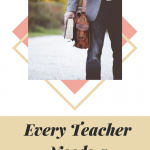"Being a patient's not like being a doctor, though, is it? A doctor has to know what's wrong with people. A patient sits there and waits for the doctor to put it right."
That line, spoken by a character in A Most Wanted Man by John Le Carre, has me thinking about a favorite cliché in teacher leader circles – That many in the public think that the thousands of hours they spent from kindergarten through high school is enough to know what it takes to be a teacher. The line is usually delivered to an audience of teachers and is never disputed.
I've passed the cliché along myself but am going to stop for several reasons.
First, like most clichés, this one intends to stop thought rather than deepen it. To deepen thought one needs to probe challenging views rather than dismiss them.
Second, the cliché is never used to dismiss ideas that align to the speaker's own. I've never heard a teacher say:
I know a mom who says test scores should only be a tiny part of a teacher's evaluation because that's how it was when she was in school. But really, just because she was a student once doesn't mean she knows how teachers should be evaluated.
Third, nearly every opinion a non-educator holds is also held by a teacher somewhere. Ironically, many of those teachers' opinions come as much from their experience as students and from their experience as teachers. For example, during retention meetings, I've heard teachers say that the only reason they did any work in school was because they were afraid to have to repeat a grade, so we should retain more kids.
Fourth, the cliché is nearly always offered in either defensive or condescending tones. Neither of which improves the public's perception of teachers.
Fifth, having spent thousands of hours with dozens of teachers does give one a pretty good data set by which to compare and judge and talk about teachers and teaching. That's because the most visible part of teaching – delivering instruction – hasn't much changed. Inspiring and boring teachers from the 70s would find their counterparts in no time in a 2014 school faculty lounge. The science classrooms in my school today look exactly like the ones in the junior high school I attended in 1969.
The hidden part of teaching – the professional development, the lesson planning, the strategic and real-time decision making, the differentiation of instruction, and the like is a different story. But do you ever hear people outside of education talk about those things anyway?
One area in which the visible part of teaching has changed over the decades is the high stakes testing and attendant detritus that education is encumbered with today. But many adults left school before the era of high stakes testing and can't draw on their own experience to form an opinion.
Sixth, the general public only partially informs its opinions on its own experiences in school. Just as important is the role of media coverage of education. Tell me where and when you went to school and I won't be able to predict your views on education. Tell me if you read National Review or listen to NPR and I bet I will. Unless you do both (like me!).
I think the next time I hear a speaker refer to the inadequacies of using one's experience as a student in forming one's opinion about teaching, I'm going to play close attention to what came immediately before and immediately after. Then I'm going to look for a more thought-provoking option. I just hope whatever I come up with doesn't become its own cliché.









Comments 1
Hi, Sandy! These are great comments. I really connected with your ideas that teachers need to be advancing the dialogue instead of stopping it with sarcasm. I’ve actually never heard this phrase before, but I am going to think very carefully about similar situations and how I can respond to deepen the conversation. Thanks!